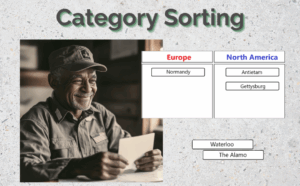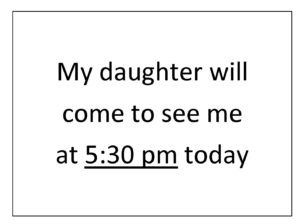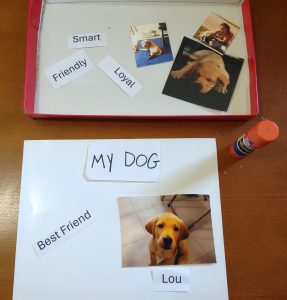12 Key Montessori Principles for Persons with Dementia
What are the Montessori Principles?
Dr. Cameron Camp describes how we can improve the lives of those living with dementia in the video below.
Hear some heartwarming stories and applications of the 12 Montessori Principles in this playlist with Dr. Camp, who shares his experiences and examples of Montessori in action.
Responsive Behavior Tools
 RESPONSIVE BEHAVIOR REDUCTION FORMULA – This tool was created in conjunction with our colleagues at Florida State University College of Medicine Department of Geriatrics, who turned our formula for addressing responsive behaviors in older adults with dementia into a brief poster that can be used to understand WHY a behavior is occurring. [Download here]
RESPONSIVE BEHAVIOR REDUCTION FORMULA – This tool was created in conjunction with our colleagues at Florida State University College of Medicine Department of Geriatrics, who turned our formula for addressing responsive behaviors in older adults with dementia into a brief poster that can be used to understand WHY a behavior is occurring. [Download here]
- Learn more about the formula for understanding responsive behaviors in the book “Hiding the Stranger in the Mirror: A Detective’s Manual for Solving Problems Associated with Alzheimer’s Disease and Related Disorders“
RESPONDING TO BEHAVIORAL SYMPTOMS OF DEMENTIA – This handout is another excellent resource from the REACH team at Florida State University College of Medicine Department of Geriatrics. Designed to be stored in your phone or tablet for easy reference for anyone providing care to someone with dementia who seems agitated or refuses help, this guide offers some ideas to try and help someone experiencing frustration or having a hard time communicating. [Download here]
– This handout is another excellent resource from the REACH team at Florida State University College of Medicine Department of Geriatrics. Designed to be stored in your phone or tablet for easy reference for anyone providing care to someone with dementia who seems agitated or refuses help, this guide offers some ideas to try and help someone experiencing frustration or having a hard time communicating. [Download here]
Click here to read a letter from the creators of this tool on how to use it.
 DEALING WITH RESPONSIVE BEHAVIORS IN PERSONS WITH DEMENTIA DURING PERIODS OF CONFINEMENT LINKED TO THE CORONAVIRUS (Article)– In times of confinement or lock-down, many elderly people with cognitive disorders, particularly those who are sensitive to changes in the environment, see an increase in their deficits, including responsive behaviors.
DEALING WITH RESPONSIVE BEHAVIORS IN PERSONS WITH DEMENTIA DURING PERIODS OF CONFINEMENT LINKED TO THE CORONAVIRUS (Article)– In times of confinement or lock-down, many elderly people with cognitive disorders, particularly those who are sensitive to changes in the environment, see an increase in their deficits, including responsive behaviors.
How then to cope with increased responsive behaviors? How can one manage this crisis situation, trying to avoid making the situation worse, and deal with the exhaustion of everyone involved? What solutions are there other than medications with harmful side effects? Our friend Jérôme Erkes of AG&D Montessori Lifestyle offers some answers to these questions in his article titled, “Dealing with responsive behaviors in persons with dementia during periods of confinement linked to the coronavirus”. [Download here]
Activities and Ideas for Engagement
Category Sorting for Veterans or History Enthusiasts
Category Sorting is an engaging activity that can be done one-on-one or as a group, allowing participants to practice reading and gross motor skills, evoke personal memories, and enjoy social interaction and discussion.
This activity guide offers instructions on setting up a category sort that may be of interest to veterans of the Armed Forces or anyone with an interest in History or Geography.
Independent Work Station Idea Sheet
Setting up Montessori-based activity stations that align with an individual’s interests helps them engage with their environment in a more meaningful way, especially when using cues and templates, considering a person’s strengths, and breaking a task into steps. These ideas and tips may help you set up Independent Work Stations in your home or care community.


The activities below are a sample selected from A Different Visit and Montessori-Based Activities for Persons with Dementia Volume 1 and Volume 2 Activity Manuals. Learn more about the Montessori principles demonstrated by the activities in the 12 Key Principles of the Montessori Inspired Lifestyle® online course.
Click the name of each activity to view a description and download full instructions.
These activities demonstrate the Montessori principle of The activity should have a sense of purpose and capture interest.
These activities demonstrate the Montessori principle to Invite the person to participate.
These activities demonstrate the Montessori principle of Demonstrate More. Talk Less.
These activities were selected to demonstrate this Montessori principle: Abilities. Focus on what the person can do.
These activities and tools demonstrate the Montessori principle to Use visual hints, cues, and templates.
These activities utilize the Montessori principle to give the person something to hold.
In these activities, participants succeed using the Montessori principle go from simple to more complex.
Videos
View the videos below in full screen by clicking the square in the bottom right corner of each player.
Reading Roundtable® Activity Booklets and Readings by Dr. Camp
Reading Roundtable® Activity Booklets are designed for engagement and reminiscence. In our new series, Dr. Camp reads select Reading Roundtable® booklets and adds even more content. View these together with your loved one or a care community resident, taking time to pause the video to invite discussion and engagement. These videos can serve as a demonstration on how to get the most out of a Reading Roundtable® Activity Booklet by elaborating on the content and adding a personal touch to connect with the story and the person you are with.
Montessori: The Ultimate Person-Centered Approach to Leadership Development, Staff Engagement and Dementia Care
![]()
Engaging persons with dementia in meaningful activity, creating a community of such persons who care for each other and are connected to the outside world. This approach is the most effective way of reducing responsive behaviors, and results in substantial reduction in the use of psychotropic medications, hypnotics, etc. In essence, it is a way of living which we call the Montessori Inspired Lifestyle®. Though this method initially was developed as an educational system for children, this approach is beneficial for all persons. When applied as a management approach to care partners, it provides a positive work environment, increased autonomy, and high levels of employee engagement. These in turn result in reduced staff turnover, increased longevity, and better communication. Thus, the Montessori Inspired Lifestyle® provides a person-centered care approach through all levels of care systems.
View the video here or on the Linked Senior website
Using Montessori Principles to Radically Improve Engagement for Residents and Staff
Dementia Alliance International May 2020 “Meeting Of The Minds” Webinar
Montessori believed the most important task of a teacher was not to teach but to observe the students and create an environment that encouraged students to teach themselves and each other what they needed to know when they needed to know it. She achieved amazing results! Similarly, amazing results are achieved when her approach is applied to persons living with Dementia, such as a dramatic reduction in drug use to control unpleasant or aggressive behaviours, reduction in staff & resident injuries, and an increase in level of activity of residents. How powerful it would be if these same principles were applied at the same time to front line staff and those who supervise them. Effectively, this would create a new architecture for workplace culture, making it possible for employees to be the best versions of themselves as often as possible. We will review two case studies from organizations on their successful journey to breathe Montessori Inspired Principles into their organizations. It’s a Human Thing®
View the video here or on the DAI website
Windsong Memory Care 2020 Virtual Education Series

In the summer of 2020, Dr. Cameron Camp and Gary Johnson were hosted Windsong Memory Care to explore how to create a Montessori Inspired Lifestyle® Community and ways to address unique and challenging situations using a Montessori approach.
Interviews and Demonstrations
Visit our YouTube page to find demonstrations, presentations, and interviews with Dr. Camp and our colleagues around the world. Here are a few of our favorites:
Coronavirus (COVID-19) Dementia Care Resources
At a time of isolation for many living in care communities around the world, AG&D and our partners in France, as well as many others around the world, are generously sharing resources with all of us to help ease the challenges that face our healthcare professionals and residents in long-term care. Please make use of these and adapt to the needs of your particular community. Check back here periodically, or follow us on social media to be notified when more resources are added.
Support for Older Adults
Newsletter Archive
Browse previous newsletters by clicking the links below. If you would like to sign up for our mailing list, click here and be sure to add info@cen4ard.com to your “safe senders list”.
-
Summer 2024 – Realize your potential
-
Spring 2024 – Refresh your perspective
-
Winter 2024 – Misstakes are our freinds
-
Fall 2023 – Get in the Zone
-
Spring 2023 – Engagement for Everyone
-
Winter 2023 – Montessori Mini Lessons
-
Fall 2022 – Updates, Activity Ideas, Events, and More
-
Summer 2022 – Supporting reformers and innovators in healthcare
-
Spring 2022 – The seeds we sow are the seeds of hope
-
July 2021 – Use cues, hints, and templates
-
June 2021 – Match your speed to theirs. Slow down.
-
May 2021 – Abilities. Focus on what the person can do.
-
April 2021 – Demonstrate More. Talk Less.
-
March 2021 – Offer choice whenever possible.
-
February 2021 – Invite the person to participate.
-
January 2021 – The activity should have a sense of purpose and capture interest.
-
November 2020 – Announcements, Events, and Coronavirus Care Tools
Product Resources and Support
Many of the products in our online store are accompanied by instruction manuals, videos, and other resources.
Click here to view supplemental resources for our books, activity manuals, reading materials, and more.
Click here for the dementia-related resources cited in the book, Hiding the Stranger in the Mirror.















 Montessori Principle 1 also entails capturing interest. Here is an activity that will be engaging and entertaining for any sports fans. The activity presented here is set up for baseball, but can easily apply to any sports teams. Beyond an engaging activity that captures interest, its purpose can also be to prepare for a family visit so that family members can complete the matches together with their loved one. Creating materials for this activity should be done by the individuals with dementia, providing the purpose of creating an activity for others to enjoy.
Montessori Principle 1 also entails capturing interest. Here is an activity that will be engaging and entertaining for any sports fans. The activity presented here is set up for baseball, but can easily apply to any sports teams. Beyond an engaging activity that captures interest, its purpose can also be to prepare for a family visit so that family members can complete the matches together with their loved one. Creating materials for this activity should be done by the individuals with dementia, providing the purpose of creating an activity for others to enjoy. Being invited on a date is a feeling we can all appreciate. This
Being invited on a date is a feeling we can all appreciate. This  A personal invitation is often the most meaningful, and what can be more personal than one’s own
A personal invitation is often the most meaningful, and what can be more personal than one’s own 






 can be easily implemented at home to practice active range of motion, grip strength, and the skills necessary to open and close jars and maintain independence.
can be easily implemented at home to practice active range of motion, grip strength, and the skills necessary to open and close jars and maintain independence.


 Squeezing activities facilitate the ability to grasp objects and use tools, allowing participants to interact more effectively with the environment. Additionally, squeezing helps develop hand and finger muscle conditioning, range of motion, and fine motor skill development.
Squeezing activities facilitate the ability to grasp objects and use tools, allowing participants to interact more effectively with the environment. Additionally, squeezing helps develop hand and finger muscle conditioning, range of motion, and fine motor skill development. Getting a person with dementia to help prepare food is a good way to promote eating and swallowing skills. The sight and smell of food being prepared can stimulate interest in tasting the food, and can access memories surrounding dining, cooking and baking. Here are a few examples which can be presented one at a time or across several sessions.
Getting a person with dementia to help prepare food is a good way to promote eating and swallowing skills. The sight and smell of food being prepared can stimulate interest in tasting the food, and can access memories surrounding dining, cooking and baking. Here are a few examples which can be presented one at a time or across several sessions.
 A collage, for our purposes, consists of a collection of pictures that are compiled together for display and enjoyment. This activity provides individuals with the freedom to create a piece of art that has significance and meaning to them. Here is another opportunity to customize the activity, as it includes flexibility for a range of skill levels. Start with a very simple collage and add complexity if that works for the person with dementia.
A collage, for our purposes, consists of a collection of pictures that are compiled together for display and enjoyment. This activity provides individuals with the freedom to create a piece of art that has significance and meaning to them. Here is another opportunity to customize the activity, as it includes flexibility for a range of skill levels. Start with a very simple collage and add complexity if that works for the person with dementia. The dissemination of Covid vaccines among residents of care communities brings hope and light at the end of this dark tunnel. As we take this step toward the future, please remember to support people with dementia and consider their ability or difficulty in communicating pain, as pointed out by the team at
The dissemination of Covid vaccines among residents of care communities brings hope and light at the end of this dark tunnel. As we take this step toward the future, please remember to support people with dementia and consider their ability or difficulty in communicating pain, as pointed out by the team at Our friends at
Our friends at 



 ADAPTED BREATHING MEDITATION AND RELAXATION – To ease the challenges of confinement, take a break, a moment, a breath, to find calm in the present. In uncertain times, many thoughts and emotions run through everyone, including the elderly. In such a context, taking a few moments to reconnect with yourself and your breath can be a precious commodity. Here are some practical sheets adapted from meditations centered on breathing to help ease tensions and find a little calm, even if it is only for a few moments. Designed to be used individually, they can be adapted for group use (respecting social distance and protective measures, of course). For people who have never done this kind of exercise, invite them with a quiet curiosity. It only lasts a few short minutes, after all.
ADAPTED BREATHING MEDITATION AND RELAXATION – To ease the challenges of confinement, take a break, a moment, a breath, to find calm in the present. In uncertain times, many thoughts and emotions run through everyone, including the elderly. In such a context, taking a few moments to reconnect with yourself and your breath can be a precious commodity. Here are some practical sheets adapted from meditations centered on breathing to help ease tensions and find a little calm, even if it is only for a few moments. Designed to be used individually, they can be adapted for group use (respecting social distance and protective measures, of course). For people who have never done this kind of exercise, invite them with a quiet curiosity. It only lasts a few short minutes, after all.

 SELF-MASSAGE OF THE HANDS AND FACE FOR WELL-BEING AND RELAXATION – Our seniors can be their own best allies when they are not able to be with others. With these two adapted activity sheets, we invite you to help them care for themselves and to relax independently… without you! No need for equipment or big speech – all the ingredients that an individual would need are:
SELF-MASSAGE OF THE HANDS AND FACE FOR WELL-BEING AND RELAXATION – Our seniors can be their own best allies when they are not able to be with others. With these two adapted activity sheets, we invite you to help them care for themselves and to relax independently… without you! No need for equipment or big speech – all the ingredients that an individual would need are:


 GARDENING YOUR SOUL KIT – This is a small “indoor gardening kit” to share and disseminate freely to the caregivers around you! Print, cut, and tie together to create a pocket-sized self-care kit, so those that are giving care to others can also have some time to care for themselves. Each card in this kit has a 5-minute exercise to calm, connect, and find a moment of peace throughout the day. Anyone that has time to create these can drop them off for long term care staff, hospitals, or anyone that would find it useful. We have translated this kit from our friends at
GARDENING YOUR SOUL KIT – This is a small “indoor gardening kit” to share and disseminate freely to the caregivers around you! Print, cut, and tie together to create a pocket-sized self-care kit, so those that are giving care to others can also have some time to care for themselves. Each card in this kit has a 5-minute exercise to calm, connect, and find a moment of peace throughout the day. Anyone that has time to create these can drop them off for long term care staff, hospitals, or anyone that would find it useful. We have translated this kit from our friends at